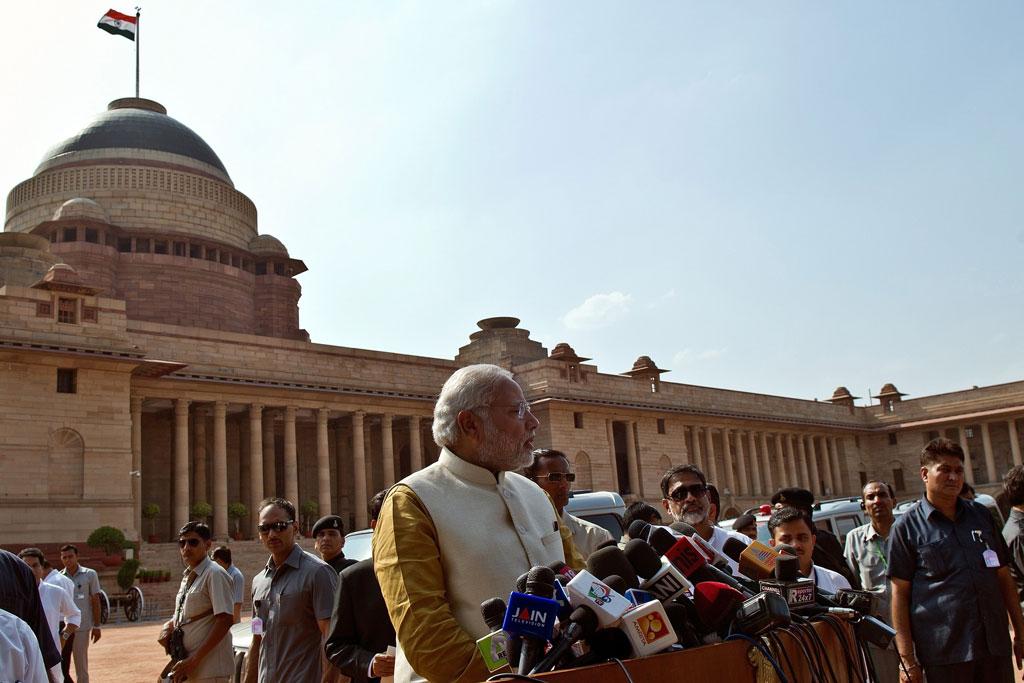India’s prime minister-elect Narendra Modi invites Pakistani leaders to his inauguration
India’s prime minister-elect Narendra Modi addresses the media after his meeting with President Pranab Mukherjee at the Presidential Palace in New Delhi on May 20, 2014.
Indian prime minister-designate Narendra Modi on Wednesday invited the leaders of Pakistan and other neighbors to his inauguration next week in an unprecedented move, signaling his aspirations to be a regional leader.
India, the regional heavyweight, has long had difficult ties with its neighbors, most notably Pakistan, but also smaller nations, such as Nepal and Bangladesh, over trade, immigration and river sharing issues.
But in reaching out to members of the South Asia Association for Regional Cooperation at the very start of his administration, Modi may also be seeking to address concerns that long-time rival China is making inroads in the region.
Pakistani Prime Minister Nawaz Sharif was on the guest list of leaders from the eight-member regional grouping invited to attend Modi's swearing next Monday, government and members of his Bharatiya Janata Party said.
"India's Foreign Secretary Sujatha Singh writes to SAARC counterparts inviting their leaders to attend swearing-in ceremony on 26th May," Foreign Ministry spokesman Syed Akbaruddin wrote on social media website Twitter.
If the Pakistani prime minister were to attend the planned ceremony in the forecourt of the presidential mansion, the event would be a first in the history of the nuclear-armed rivals, who have fought three wars since independence in 1947.
It was not immediately clear if Sharif would accept. Analysts said the visit would be politically difficult.
Pakistan's high commission in New Delhi said it had not yet received the invitation. But Sri Lankan President Mahinda Rajapaksa's office said he would fly to Delhi for Modi's swearing-in.
"The president has got the invitation similar (to) all other South Asian leaders. President Rajapaksa…will participate in the inauguration," a presidential aide told Reuters on condition of anonymity.
China has built a port in Sri Lanka and is involved in upgrading another in Bangladesh, besides its military and civil assistance to long-time ally Pakistan, heightening Delhi's anxieties of being boxed in.
"Politically, inviting the regional leaders is a smart move," said C. Raja Mohan, an influential foreign policy analyst. "As the largest country in the region, India should be reaching out to its neighbors."
Even if Sharif cannot come, the new administration in New Delhi is signaling its wish to re-engage with the neighbor, analysts said.
Political capital
The victorious BJP has long advocated a tough stance on Pakistan and Modi is seen as an uncompromising hardliner on issues of national security.
But his huge election victory also gives him the political capital to reach out to difficult neighbors, including Pakistan, in a way his predecessor Manmohan Singh could not, weakened by graft scandals and public discontent at home.
After his own election last year, Sharif's administration had also suggested that the Indian prime minister be invited to attend the ceremony, but Singh declined.
Sharif is known to have faced resistance from hardliners at home, notably within the armed forces, over his more dovish stance toward India.
Sharif may not attend the ceremony but send a representative instead, Indian television channel CNN-IBN said, citing unnamed sources.
"We are of the view that the highest priority should go for reviving the economy," said Subramanian Swamy, chairman of the BJP's strategic action committee. "Which means that we would like to avoid any destabilizing events and therefore would be quite keen to talk it out in case there's a misunderstanding."
Over the past few weeks, representatives from India and Pakistan have been in touch both on the official track as well as backchannels, as Modi emerged as the election front-runner.
Pakistan's high commissioner, Abdul Basit, has been meeting BJP members to convey his country's willingness to engage meaningfully with India's new government, the Economic Times reported, citing unnamed government sources in Pakistan.
Jitendra Kumar, an associate of Modi's from the Hindu parent body Rashtriya Swayamsevak Sangh, said he visited Pakistan last month to meet Sharif's foreign affairs adviser, Sartaj Aziz.
Kumar, an energy consultant in the United States, said he had frank discussions with the leaders of Pakistan.
"I seriously believe that Pakistan is interested in improving relations with India," said Kumar. "The Pakistanis are very sincere. "My expectation is that things will improve. (Modi) is a good administrator."
(Reporting by Sruthi Gottipati; Writing by Douglas Busvine and Sanjeev Miglani; Editing by Simon Cameron-Moore)
The article you just read is free because dedicated readers and listeners like you chose to support our nonprofit newsroom. Our team works tirelessly to ensure you hear the latest in international, human-centered reporting every weekday. But our work would not be possible without you. We need your help.
Make a gift today to help us reach our $25,000 goal and keep The World going strong. Every gift will get us one step closer.
